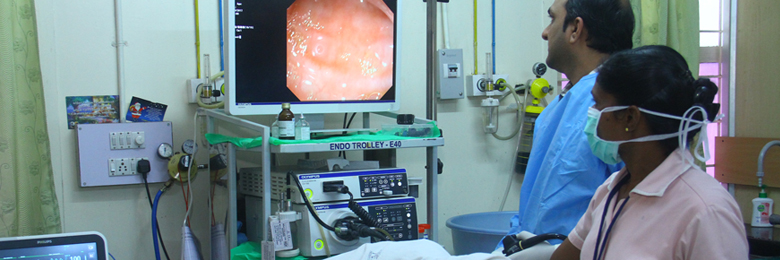
Gastroenterology
The department started in 1999 with a lone consultant, Dr L. Venkatakrishnan, who is the Head of the Department at present. The faculty strength increased to two when Dr J. Krishnaveni joined in the year 2002. Now it has four consultants. At the time of its inception, it had a full endoscopy unit and two technicians. At present, the endoscopy unit is manned by six technicians and three staff nurses. Over the years, the endoscopic facilities, including those for treatment of liver-related disorders, have been improved upon.
Contact Information
Email id:
gastroenterology@psgimsr.ac.in-
Contact Number:
+91-422-4345270-5240
Helpline:
+91 9952149911
Upper Gastro Intestinal (UGI) endoscopy is a procedure that enables the doctor to examine the interior lining of the oesophagus and the stomach. UGI endoscopy is used to treat peptic ulcer bleed and other sources of bleeding from the stomach, avoiding the necessity for open surgery. It also has a role in treatment of pancreatic disease apart from common bile duct stone removal and treatment of bile duct injuries (ERCP). Enteroscopy, a procedure which helps doctors identify and treat lesions in the small intestine is also performed. Diseases of the large intestine are diagnosed and treated with the help of colonoscopy. All these procedures are routinely done in the department.
The department started a motility lab for oesophageal and anorectal disorders in 2008. It makes use of the advanced training received by faculty at prestigious centres like the University of Brussels, the University of Copenhagen, and the University of Paris through fellowships. This department, which excels in comprehensive management of acute liver failure, also started a super-speciality course (DM Gastroenterology) in 2009.
Regular clinical research is done along with the molecular medicine department and papers are published in international journals.Recently three hepatobiliary and liver transplant surgeons have joined the institution and liver transplants have been started.
Sub Specialities
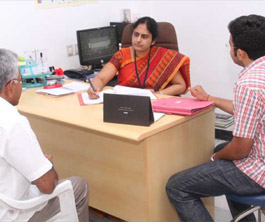
- Hepatology
- Luminal disorders
- Pancreaticobiliary
- Paediatric Gastroenterology
- Interventional Endoscopy
Areas of Services include
The Endoscopy services function on all weekday and includes a 24×7 emergency services.
- Endoscopy:
- Upper GI, colonoscopy
- Diagnostic & Interventional
- ERCP
- Diagnostic & Therapeutic
- Biliary & Pancreatic
- Enteroscopy – Scopy of the small bowel
- Capsule Endoscopy – Using a pill camera which is swallowed and images are captured using software
- Manometry – Esophageal & Anorectal
- Endoscopic Ultrasound – Diagnostic & Therapeutic
- Paediatric Endoscopic procedures
- Liver Biopsy
Some of the problems treated are
- Hiatus hernia, reflux from the stomach into the esophagus. The food in the stomach goes the wrong way – up the esophagus
- Stomach Ulcers; these can cause indigestion, also bleeding into the gut
- Malabsorption; when food is not properly absorbed
- Cancer of the gut, liver, pancreas
- Inflammatory bowel disease like Crohn’s and ulcerative colitis
- Jaundice due to liver diseases like hepatitis and cirrhosis caused by alcohol, hepatitis B & C
- Gall bladder problems like gall stones, common bile duct stones
- Emergency treatment is also offered. This is usually for gastrointestinal bleeding and pancreatitis (inflamed pancreas)
Areas of Services
Upper Gastrointestinal Endoscopy: (Diagnostic & Therapeutic):
This is putting in a tiny camera on a tube (small finger size tube) through the mouth. This can diagnose and find out what the problem is. Some conditions that can be treated using the endoscope include:
- Variceal sclerotherapy – Large veins that bleed can be treated by injections
- Variceal ligation – tying off large veins to stop them bleeding
- Cyanoacrylate Injection of Varices – Injecting large veins
- Esophageal dilatation – dilating the esophagus (gullet) when there is a narrowing
- Pneumatic Dilatation – dilating using special air pressure
- Enteral Tube placement – Putting a feeding tube in stomach or small intestine
- Placing a feeding tube in stomach (PEG) for neurological conditions
- Chromoendoscopy
- Heater Probe Application
- Argon Plasma Coagulation (APC) For hemorrhagic lesions – treating areas that are bleeding
- Polypectomy – removing polyps from the gut. These are small outpouchings from the mucosa
Colonoscopy (Diagnostic & Therapeutic)
This is putting in a tiny camera on a tube (small finger size tube) through the anus – lower part of the gut.
- Polypectomy – removing polyps from the lower part of the gut
- Enteral Stent Placement is putting in a stent which is piece of equipment that holds open narrowed areas
- APC for Hemorrhagic lesions – Treating bleeding areas secondary to radiation or vascular malformations
- Chromo-endoscopy – Uses stains or dyes to find bad cells. This may be cancer
ERCP (Diagnostic & Therapeutic)
Endoscopic retrograde cholangiopancreatogram (ERCP). This is done by a side viewing scope through the mouth and then dye is injected into the bile duct or pancreatic duct.
Biliary Procedures
- Sphincterotomy – Cutting an opening in the bile duct (sphincter)
- Stone Removal – Removing bile stones. Stones can grow in the gall bladder. They can then go into the biliary ducts and block them
- Nasobiliary Drain – Putting a drain into the bile duct. A tube that goes from inside the body of the skin outside. This lets fluid from inside the body go to the outside
- Stent Placement – Putting a stent into the bile ducts. A stent is a plastic or metal tube that holds open narrowed areas
- Stricture Dilatation – Making a narrowed segment wider by balloon or dilators
Pancreatic Procedures
- Pancreatic Stenting – putting a stent into the pancreatic duct (see above)
- Sphincterotomy – Cutting an opening to the pancreas that has become too small
- Stone Removal – Removing stones. The stones can then go into the pancreatic duct and block them
- Nasopancreatic Drainage – Putting a drain into the pancreas (see above)
- Accessory Papilla Sphincterotomy – Cutting an opening to the pancreas (sphincter). Done when the opening gets too small
- Pseudocyst Drainage – A large amount of liquid can make something like a cyst. This can be drained
Endoscopic Ultrasound
- Staging esophageal, rectal and pancreatic tumors – Staging means finding out how far a tumor or cancer has spread. The esophagus is the tube from the mouth to the stomach
- Diagnosis of Submucosal lesions
- Diagnosis of Pancreatico Biliary Disease
- Pseudocyst Drainage
- Pelvic abscess drainage
Capsule Endoscopy
- This test is done to assess the small bowel beyond the second part of duodenum upto the distal ileum. The advantage of enteroscopy is that in addition to being diagnostically helpful, even therapeutic procedures can also be done.
Enteroscopy – To look into disease of small intestine
- This test is done to assess the small bowel beyond the second part of duodenum upto the distal ileum. The advantage of enteroscopy is that in addition to being diagnostically helpful, even therapeutic procedures can also be done.
Paediatric Procedures
- Procedures are done under anaesthesia
- Upper GI problems, problems in the upper part of the gut
- Lower GI problems, problems in the lower part of the gut
- ERCP
Our Faculties
HoD
Associate Professor
-
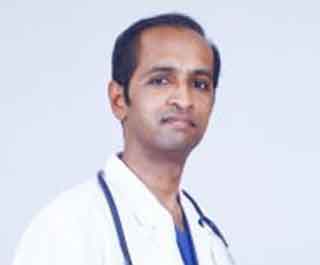
Dr Mukundan Swaminathan
Gastroenterology
Associate Professor
-
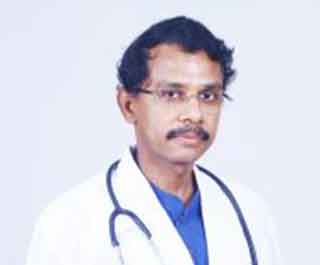
Dr. Thirumal P
Gastroenterology
Associate Professor
Assistant Professor
-
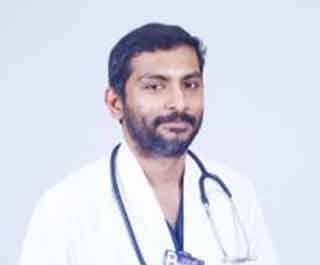
Dr. Arun P
Gastroenterology
Assistant Professor
-

Dr. R. K. Kartikayan
Gastroenterology
Assistant Professor



